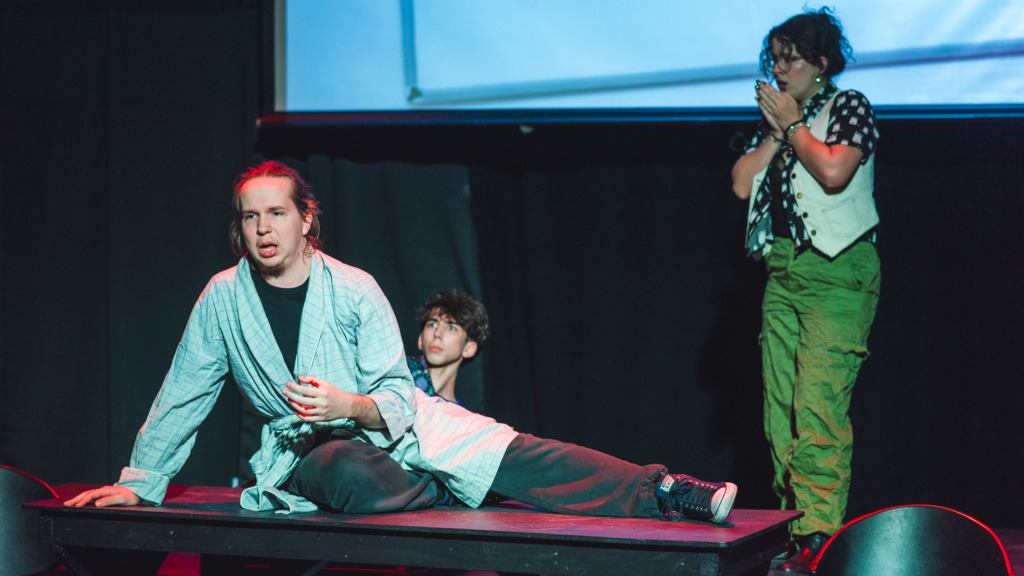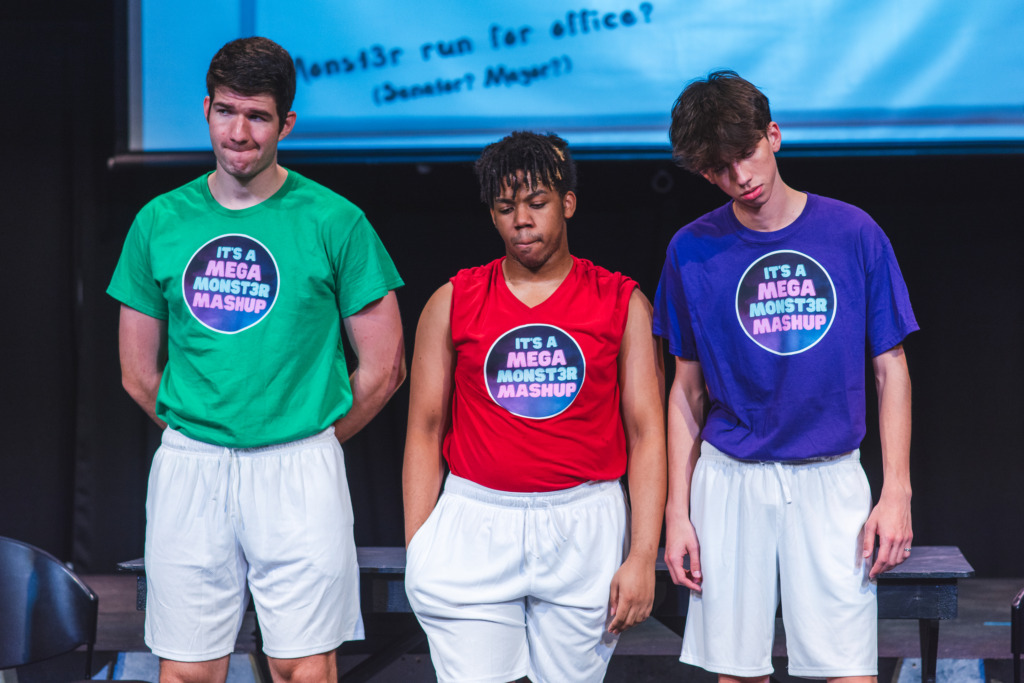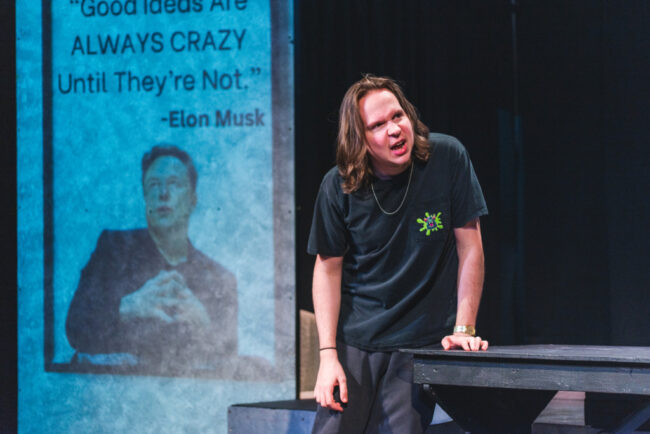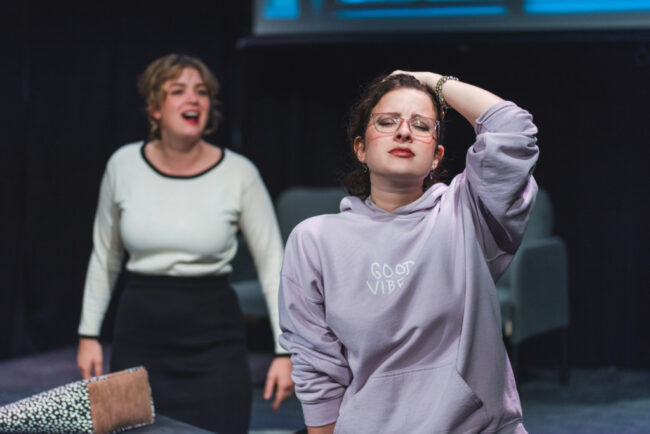Reputation is everything. You either have enough wealth to buy reputation or you have enough reputation to be wealthy. That’s the vicious cycle of existing. Or at least existing on the internet. In a world-premiere of Marshall Logan Gibbs’ new work, Monster (or #MeToo, Brute) the ‘safe space’ of the internet is deeply examined through an all-too relatable lens. Directed by Maxwell Wolf, this current production appears as one of two brand new works being produced by The Maryland Theatre Collective this 2024/2025 season and is deeply poignant, impressively polished in both its structure and form, and sends a harrowingly relevant message to its audience.

The work itself feels highly polished, brushed with a stroke of professionalism, sealed with topical realness that is devastatingly relatable and eerily haunting. Marshall Logan Gibbs has tackled an unspoken elephant with this work, which in itself is ironic as the crux of the play is about finding a way to create voice and agency for the voiceless. Centered around a content creator— or better known in the world of the web as ‘Influencer’— who is aptly called ‘Monst3r’, the play shines a brutal and necessary light on the ugly truth of the toxic culture festering just beneath the surface of the social media phenomenon that has overcome today’s society. Gibbs’ writing possesses a smoothness to it that flows naturally through scenes of dialogue whilst keeping the audience invested in what’s actually being discussed. And despite the darker and more sinister tones of the play, which are equally well penned, he manages to find ways to infuse believable humor into his dialogue exchanges. There is a particularly good series of innuendo-exchanges between the characters of Delilah and Olivia during their initial encounter that is both charmingly cheeky and has a natural feel to it.
Gibbs’ also toes the fine line of addressing the social issue in his work without feeling heavy-handed, hammerlike, or soap-box-preachy. He does what his character’s set out to do— start the conversation on a topic in desperate need of discussion. He changes the narrative and creates a safe space for the unvoiced to have their voice. The characterizations that Gibbs has penned into the work are heavily weighted with authenticity as well; there is a danger to lean into the caricature-nature of some of these types of individuals but Gibbs strikes a balance between their larger-than-lifeness and their humanity, making the audience have a vested interest in their journey. There’s a powerful speech— monologue of sorts— penned into the Olivia character that gets delivered near the show’s conclusion, which speaks volumes about the ‘voice’ and ‘safe space’ that the internet originally gave to people, particularly to kids and teenagers, versus what it has become and how it is what it is now for better or for worse. It’s some truly striking verbiage and a humbling message to boot.

Appearances can be deceiving so don’t let the simple scenic setup that Director Maxwell Wolf has put on stage fool you. It may be a table with a riser platform and some spaces for projections to go, but it well-serve its purpose in its simplicity. The projections (designed by the playwright) really tie the show together as well. As the play itself centers and circles viciously around toxic social-media-influencer behavior and culture one would expect nothing less than top-notch projections. And Gibbs and Wolf deliver. There’s even a montage of ‘Influencer apologies’ slapped in the middle of the production and its wild. This harmonious blend of technology into the production is a feather in the theatrical experience cap for certain. If there’s a micro-complaint to be had about this otherwise perfect production (and I’ve only got two— and one is a very finicky-nitpicky use of the phrase “our most trustworthy sponsors…” and I spent two hours last night trying to figure out what word I would have used instead of trustworthy and I couldn’t come up with one but it still sat on my ear wrong when Olivia says it) it’s overkill usage of the ‘red special’ lighting when the gravity of the truth of the situation finally hits Olivia and she’s bent over the desk, awash and flooded with red lighting. The play is so flawlessly subtle, trusting its message, speaking its truth— and then you get a slap of overdone symbolism with that lighting choice. (Apologies to Lighting Designer Atticus Cooper Boidy, whose use of ordinary lighting and assistance during the dark-outs to highlight the videos and projections are otherwise spot-on for the production.)
The show is tight. Director Maxwell Wolf keeps the pacing superbly well lubricated, dialogue flowing naturally with superior pacing from one character to another, scenes moving swiftly forward. And you get another stunning feature of this production and its expedited feel from Fight Choreographer Mel Gabel. There are some pretty intense, albeit brief, moments of violent fighting and they are executed so succinctly that the audience can be heard gasping their shock and startled responses when these ‘fight moves’ are performed. And roping together the remaining solid qualities from the production side of things, Zach Sexton on Sound Design and Amy Haynes Rapnicki on Costume Design bring home a win in their respective categories. The audio— particularly that ‘AI-mock-up-mis-sync’— for the various video projections aligns flawlessly (or in the AI-instance anti-flawlessly) with what you’re seeing and the body mics are balanced to catch the unique vibe of the black box space. Rapnicki’s costumes gel with the show’s modern verve, particularly the ‘branded logo’ shirts that ‘The Team’ wears frequently throughout the performance.
Abby Burns may not get much stage time in the character role of Francesca— IRRELEVANT!— because you’re going to walk out of that theatre laughing your backside off at her highly humorous antics in the interrogation scene. Burns’ character assignation is bit-part-comic relief but she lives it up tenfold and has the audience in stitches for the entirety of her existence during that scene. And while Elizabeth Darby tackles the role of both Ruthie— day-time, Oprah-Ellen-style talk-show host— and Interrogator, you find similar snippets of laughter and comic relief in her portrayal, though almost all from her Ruthie persona. Darby is sharp as the Interrogator and like a mimeograph of those daytime talk show hosts that you love to hate because you hate to love them. She brings a certain stale charm to her characterization, making the character familiar and relatable and yet annoying enough that we’re all cringing just a little in our seats when we experience her, no matter how good the intentions of the character seem to be painted.

Cameron (Max Ryon), Rodney (Tyler M. White), and Plunk (Casey Brogan) embark upon a unique character arch-journey from the start of Monster (or #MeToo, Brute) through to its conclusion. While they often exist as a trio on stage, you get the distinctive sense that each of them are their own individualized human and yet could be any person in a similar situation. Their talented performance capabilities combined with Gibbs’ skeletal structure for the characters as written makes them versatile and unique whilst simultaneously making them the faceless everyman. It’s astonishing. Ryon, who is arguably the most nervous, most easily unsettled, and clearly the meagerest of the trio, gives a stunning ‘speech’ during a segment on Ruthie that is just visceral and evocative. White’s Rodney is perpetually in a frenetic state of repressed rage, trying to hold his tongue, keep himself calm, keep himself from expressing his raw and real state of emotional turmoil. Brogan, who plays the lunkhead Plunk, takes the most drastic off-the-cliff shift when it comes to characterization and it’s equal parts humorous and nauseating, particularly as the paradigm in the trio’s narrative shifts in the back-half of the play.

Living up to the moniker, Monst3r (Steven Day) is savage, unhinged, unruly, and completely and utterly toxic. Day invests wholly into this revolting performance; the truly heinous factor in play here being that it’s so real, so raw, that anyone in the audience can easily recognize this truly toxic persona…that we’ve all worked alongside, all encountered, and like so many of the other characters in the play…have all turned a blind-eye to for one reason or another. Day’s performance is aggressive and over-the-top in a way that the writing demands; it’s ensnaring in the most deplorable way imaginable. And what’s worse is that Gibbs’ work finds a way to momentarily humanize this beast. You get to the ‘needs-must-apology’ section of the play (when you see it, you’ll know exactly what I’m talking about) and as Day’s character struggles to find sincerity and remorse but then finally hits on a singular experience buried deep in his repressed past— it’s gut-wrenching— and not because the character has some deep repressed trauma but because he’s so vile, so toxic, and so unacceptable that you don’t want him to be human. You want him to be his namesake. Gibbs’ writing and Day’s performance gives you that fleeting glimpse, that ephemeral moment of humanity, which is a slap in the face to everyone watching, before it gets snatched back into the ugly blackened tarpit of Monst3r’s existence. It’s hard to find accurate words for the way Gibbs has written the character let alone the way Day is portraying him; it’s stunning and visceral and impressive and revolting all at once.

You get two unvoiced voices of the show, who much like in Julius Caesar, become the protagonists of the story, even though the titular character is presumed to be the focus. Delilah (Maggie Dennis) and Olivia (Ally Baca) are our strong, female narrative leads in this tale. Dennis’ character is introduced to the audience as this ditzy, naïve, fluff-n-stuff journalist. To the point where when she’s dropped under the table in her opening scene doing some inadvertent ‘investigating journalism’ the comedy of her body language and her overall presence in that scene borders on the ‘entrapment scenes’ from Much Ado About Nothing. Dennis’ character is perceived initially as flighty and easily dismissible until the narrative trajectory takes a violent twist off a cliff and then the severity and gravity of her character’s plight comes into play and you get a real sense of Dennis’ versatility as a performer. The more ball-busting, somewhat aloof and detached character portrayal of Olivia comes sublimely from Baca’s seasoned performance skillset. Watching Baca over and over attempt to reign-in the utter monster that is Monst3r is just harrowing. It forces questions inside the audience’s mind— why does she keep putting up with it? Would you be able to walk away as easily as you think she should walk away? And a good dozen others that are percolated in the steeping steam of the way the character is written by Gibbs and portrayed by Baca. Her firm handle on how to balance serious emotional pull from inside the character’s mentality and the quippy snappy comedic comebacks is impeccable and makes for a stellar, well-rounded performance, particularly when she and Dennis have their personalized epiphany at the end of the performance.
There’s an audience for everything. And you should be the audience for Monster (or #MeToo, Brute) because it’s as striking as it is relevant, as witty as it is wounding, and most definitely a new work well worth investing in this season.
Running Time: 2 hours and 15 minutes with one intermission
Monster (or #MeToo, Brute) plays through October 13th 2024 with The Maryland Theatre Collective in Studio194 of The Chesapeake Arts Center— 194 Hammonds Lane in Brooklyn Park— Baltimore, MD. Tickets can be purchased at the door, though they are strongly recommended to be booked in advance online.
